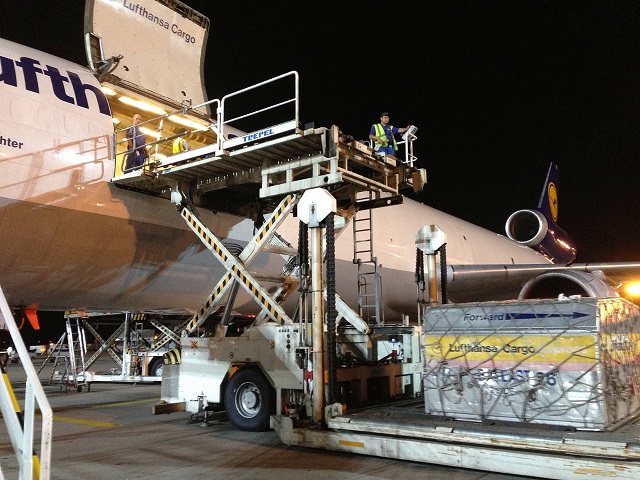 Air freight being loaded. Researchers at the Fraunhofer IFF are working with other partners on a digital fingerprint for security-sensitive air freight in the project ESecLog. This is intended to make tampering with shipments easily detectable in the future.
© Fraunhofer Fraunhofer IFF/Anna Mahler
Air freight being loaded. Researchers at the Fraunhofer IFF are working with other partners on a digital fingerprint for security-sensitive air freight in the project ESecLog. This is intended to make tampering with shipments easily detectable in the future.
© Fraunhofer Fraunhofer IFF/Anna Mahler
Researchers at Fraunhofer are endeavoring to develop a digital fingerprint for air freight items. The Fraunhofer Institute for Factory Operation and Automation is collaborating with Lufthansa Cargo and Panalpina for the Federal Ministry of Education and Research-funded project - ESecLog.
Conventional procedures such as X-ray scanning for screening of freight products are expensive and time consuming. The research team intends to develop an efficient system that does not affect security of air freight logistics.
Until now, it has not been possible to confirm if a particular freight item has been X-rayed and the researchers are trying to develop a marker to enable verification. The researchers are also developing a Radio-Frequency Identification (RFID) seal for detection of any shipment tampering.
They used an ultrafine safety wire to fix a transponder on the seal of a package. This wire would break if the package was opened and this information would be available to the screener. Poenicke stated that novel technology would enable inspection of complete pallets. The shipment with broken wires can be identified by its ID. Further, a 3D scan can be used to capture the contour of the pallet.
The researchers collect the RFID identifiers or the 3D contours of every item into a central profile. A Fraunhofer IFF project manager, Olaf Poenicke, stated that this data was to be documented and aggregated into a single digital fingerprint or image. This would provide precise information about the freight item throughout its transportation. The collected information can then be analyzed by screeners in the central fingerprint information system. This system would help reduce re-inspections.
This research is to be presented at the International Supply Chain Conference in Berlin in October 2014.
References